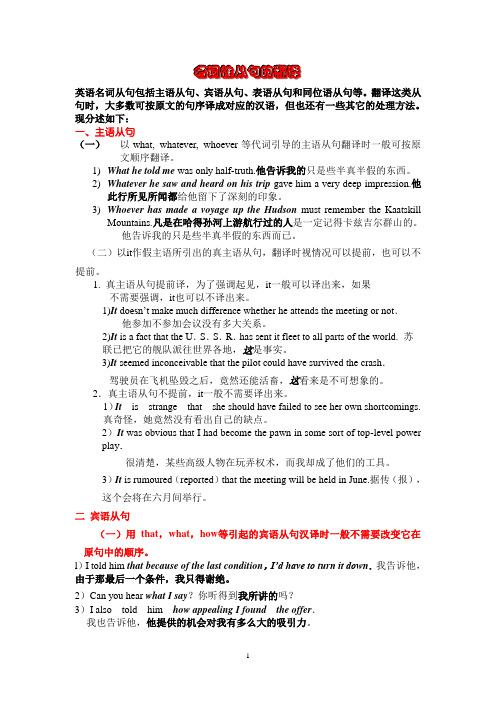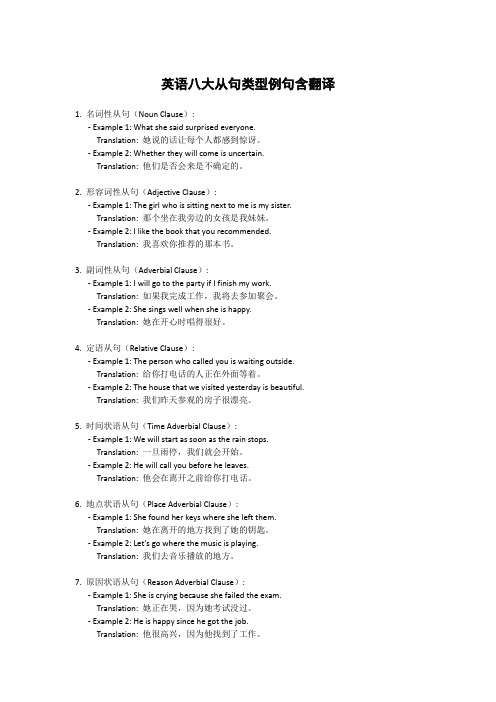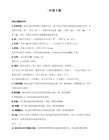6 名词性从句的译法
- 格式:pptx
- 大小:980.18 KB
- 文档页数:38

名词性从句的翻译名词性从句⼀、主语从句(⼀)以what, whatever, whoever, whether, when, where, how, why等词引导的主语从句,在翻译的时候,⼀般可以按照英语原⽂顺序来翻译。
What he told me was only half-truth.他告诉我的只是些半真半假的东西⽽已。
Whether he comes or not makes no difference.When we can begin the expedition is still a question.(⼆)⽤it作形式主语的主语从句,可以把主语从句放到汉语句⼦最前⾯去翻译。
为了强调起见,it⼀般可以译出来;如果不需要强调,it也可以不译出来。
It doesn’t make much difference whether he attends the meeting or not.他参加不参加会议没有多⼤关系。
(It没有翻译)It seemed inconceivable that the pilot could have survived the crash.驾驶员在飞机坠毁之后,竟然还能活着,这看来是不可想象的。
(It翻译为“这”)有时候,如果主语从句仍然按照英语原来的顺序翻译的话,it⼀般不需要译出来。
在汉语译⽂的开始,⼀般可以⽤“...的是,...”这样的结构来翻译。
It is strange that she should have failed to see her own shortcomings.真奇怪,她竟然没有看出⾃⼰的缺点。
(It不⽤翻译,还可以⽤“奇怪的是...”这样的结构来翻译)⼆、宾语从句(⼀)⽤that, what, how, when, which, why, whether, if 等引起的宾语从句,翻译成汉语的时候,⼀般不需要改变它在原句中的顺序。

名名词词性性从从句句的的翻翻译译英语名词从句包括主语从句、宾语从句、表语从句和同位语从句等。
翻译这类从句时,大多数可按原文的句序译成对应的汉语,但也还有一些其它的处理方法。
现分述如下:一、主语从句(一) 以what, whatever, whoever 等代词引导的主语从句翻译时一般可按原文顺序翻译。
1) What he told me was only half-truth.他告诉我的只是些半真半假的东西。
2) Whatever he saw and heard on his trip gave him a very deep impression.他此行所见所闻都给他留下了深刻的印象。
3) Whoever has made a voyage up the Hudson must remember the Kaatskill Mountains.凡是在哈得孙河上游航行过的人是一定记得卡兹吉尔群山的。
他告诉我的只是些半真半假的东西而已。
(二)以it 作假主语所引出的真主语从句,翻译时视情况可以提前,也可以不提前。
1. 真主语从句提前译,为了强调起见,it 一般可以译出来,如果不需要强调,it 也可以不译出来。
1)It doesn’t m ake much difference whether he attends the meeting or not . 他参加不参加会议没有多大关系。
2)It is a fact that the U .S .S .R .has sent it fleet to all parts of the world. 苏联已把它的舰队派往世界各地,这是事实。
3)It seemed inconceivable that the pilot could have survived the crash . 驾驶员在飞机坠毁之后,竟然还能活畜,这看来是不可想象的。
2.真主语从句不提前,it 一般不需要译出来。


英语八大从句类型例句含翻译1. 名词性从句(Noun Clause):- Example 1: What she said surprised everyone.Translation: 她说的话让每个人都感到惊讶。
- Example 2: Whether they will come is uncertain.Translation: 他们是否会来是不确定的。
2. 形容词性从句(Adjective Clause):- Example 1: The girl who is sitting next to me is my sister.Translation: 那个坐在我旁边的女孩是我妹妹。
- Example 2: I like the book that you recommended.Translation: 我喜欢你推荐的那本书。
3. 副词性从句(Adverbial Clause):- Example 1: I will go to the party if I finish my work.Translation: 如果我完成工作,我将去参加聚会。
- Example 2: She sings well when she is happy.Translation: 她在开心时唱得很好。
4. 定语从句(Relative Clause):- Example 1: The person who called you is waiting outside.Translation: 给你打电话的人正在外面等着。
- Example 2: The house that we visited yesterday is beautiful.Translation: 我们昨天参观的房子很漂亮。
5. 时间状语从句(Time Adverbial Clause):- Example 1: We will start as soon as the rain stops.Translation: 一旦雨停,我们就会开始。


名词性从句翻译名词性从句是一种从句,用作名词的作用,可以在句子中担任主语、宾语、表语、同位语或介词宾语。
名词性从句一般由连接词引导,包括连词that, whether/if , 连接代词who, whom, what, which, whoever,whomever, whatever, whichever, 连接副词when, where, why, how等等。
名词性从句的翻译要根据具体的上下文和句子结构进行灵活变通。
下面是一些常见的名词性从句的翻译示例:1. 主语从句:That he is late again is not surprising.他又迟到了并不奇怪。
2. 宾语从句:I don't know where she went.我不知道她去哪里了。
3. 表语从句:The problem is whether we can solve it.问题是我们是否能够解决它。
4. 同位语从句:The news that he passed the exam made us happy.他通过考试的消息使我们很高兴。
5. 介词宾语从句:I am not sure about what he said.我不确定他说的是什么。
6. 间接引导名词性从句:He asked where I lived.他问我住在哪里。
7. 是否从句:I wonder whether/if she will come to the party.我想知道她是否会来参加派对。
8. 选择性从句:He asked me whether I preferred coffee or tea.他问我是喜欢咖啡还是茶。
9. 宾语从句(陈述句变为疑问句):Do you know what time it is?你知道现在几点钟吗?10. 宾语从句(连接代词):I wonder who is going to pick us up at the airport.我想知道谁会在机场接我们。
英语从句翻译方法-CAL-FENGHAI.-(YICAI)-Company One1英语从句翻译方法英语多从句,汉语多分句:就句子类型而言,英语句子不仅可以在简单句中使用很长的修饰语使句子变长,同时也可以用从句使句子变复杂,而这些从句往往通过从句引导词与主句或其它从句连接,整个句子尽管表面上看错综复杂却是一个整体。
汉语本来就喜欢用短句,加上表达结构相对松散,因此,英译汉时需要将各种英语从句进行处理,可以译成一个汉语单句,也可译成多个汉语分句。
并按照汉语的表达习惯对英语复合句的关联部分(从句引导词)加以逻辑梳理,既分而叙之,又上关下联,承接转换,犹如整容。
一名词性从句的译法名词性从句包括主语从句、宾语从句、表语从句和同位语从句。
下面我们便逐一论述这些名词性从句的翻译方法。
1. 主语从句1) 由what, whatever, whoever等代词引导的主语从句汉译时一般可按原文顺序翻译。
例如:What he said is true.译文:他说的一切都是真的。
Whoever violates the disciplines should be criticized.译文:谁违犯了纪律,谁就应该受到批评。
2) 由it作形式主语引导的主语从句,翻译时视情况可以提前,也可以不提前。
例如:It doesn't make much difference whether you come yourself or send a substitute.译文:你是自己来还是派代理人来,都无关紧要。
(提前)It seemed inconceivable that the pilot could have survived the crash.译文:驾驶员在飞机坠毁之后竟然还活着,这看来是不可想象的。
(提前)It is strange that she should have failed to see her own shortcomings.译文:这奇怪,她竟然没有看出自己的缺点。